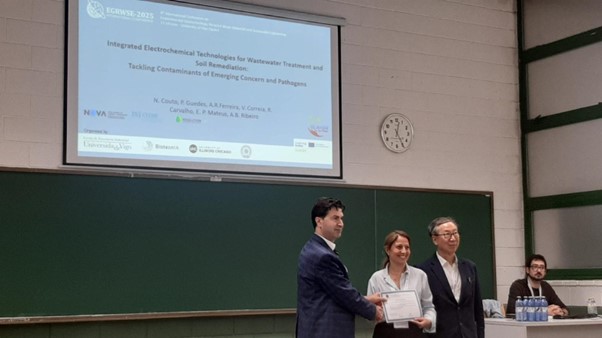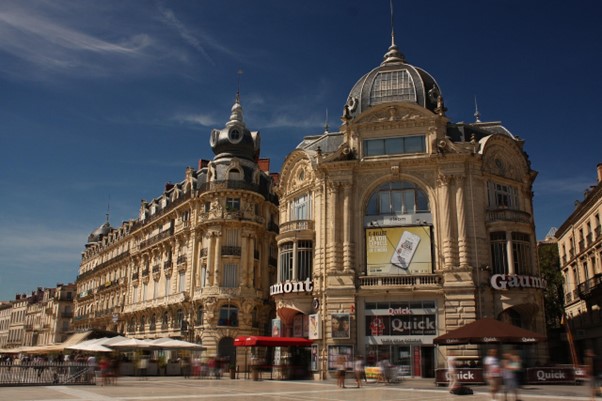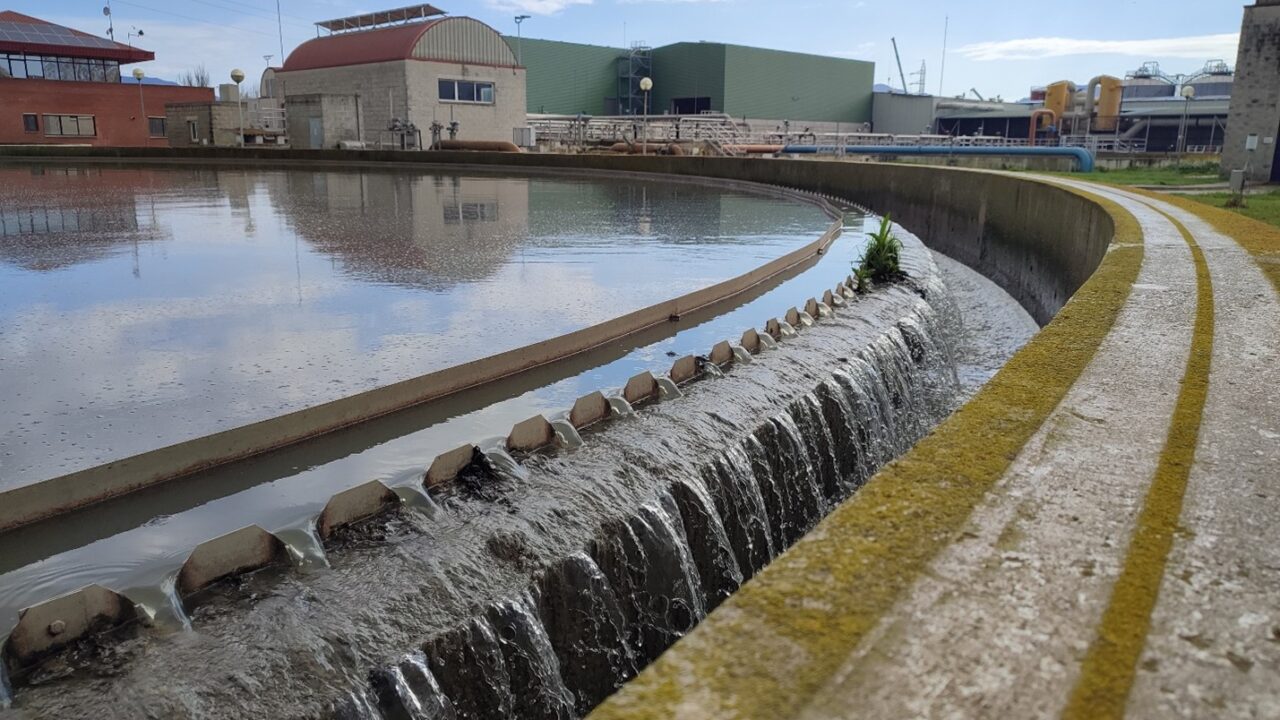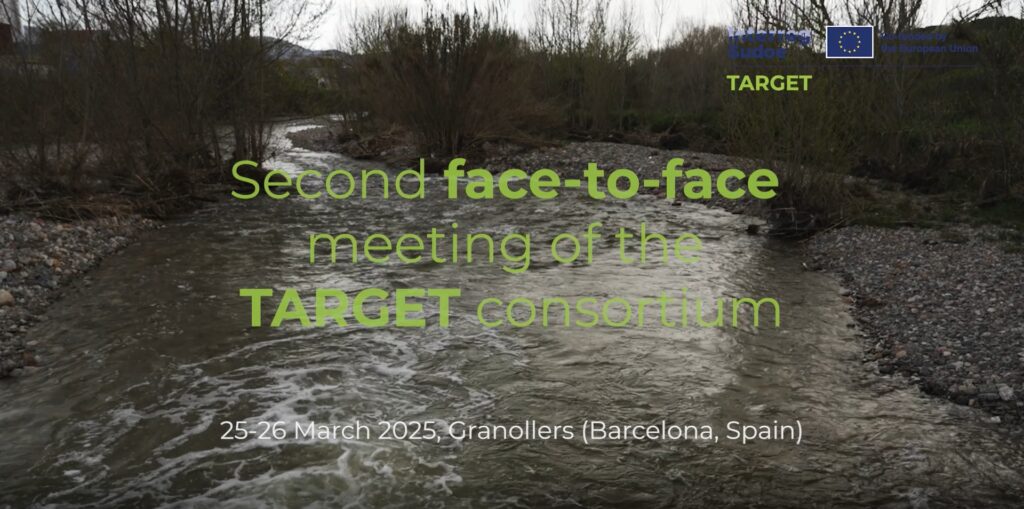Avances Técnicos
📌 Construyendo Diálogo: Un Enfoque Participativo para la Reutilización del Agua en el Dordoña
En el marco de las actividades 1.5 – acción piloto para probar la estrategia Target a nivel de cuenca y 2.4 – estudio de oportunidad para la REUT de estaciones de tratamiento de aguas, Cerema es responsable de apoyar los estudios técnicos mediante la implementación de mecanismos de consulta. Con este fin, ha encargado a la consultora Écologie Urbaine et Citoyenne (EUC), que inició su labor en marzo.
La estructuración de la consulta se basó en la brújula de participación, una aplicación desarrollada por Cerema para facilitar la organización y el seguimiento de los procesos participativos (https://boussole-participation.cerema.fr/).
La primera tarea de EUC fue elaborar un mapa dinámico de los actores involucrados. Para ello, se realizaron entrevistas con diversos agentes del sector del agua en la cuenca del Dordoña.

Taller de Cerema sobre gobernanza del agua. Fuente: Cerema, 2025.
💪 Granollers refuerza la estrategia de reutilización de agua con seguimiento científico
En este período, y en el marco de la actividad A1.3, Granollers ha elaborado la estrategia local para la Gestión Sostenible del Agua Regenerada en Granollers, basada en la Estrategia Target.
Dentro de la actividad A2.3, se ha incrementado el número de muestras de agua recogidas en distintos puntos del sistema de regeneración de Can Cabanyes para el análisis de diferentes parámetros fisicoquímicos y biológicos, y se está colaborando con la UPC en el seguimiento continuo de diversas variables para predecir situaciones de riesgo en la calidad del agua.
🛰️ Seguimiento del progreso: AMAYA supervisa entregables clave en gobernanza del agua y uso de recursos no convencionales
Entre febrero y junio de 2025, AMAYA ha seguido de cerca el avance de varias actividades clave del proyecto. Estas incluyen:
-
Una revisión sobre cómo se gestiona el agua en Francia, España y Portugal, especialmente en periodos de escasez.
-
Un resumen de los principales hallazgos sobre la gobernanza del agua en estos tres países.
-
Un análisis de las áreas donde la Estrategia TARGET podría aplicarse próximamente dentro de la región SUDOE.
-
Un estudio sobre la percepción social del uso de recursos hídricos no convencionales (como el agua regenerada) y sobre las condiciones necesarias para hacer posible y aceptable la combinación de diferentes usos del agua.
Estos esfuerzos contribuyen a una mejor comprensión de los retos hídricos regionales y de las oportunidades para soluciones sostenibles.
🗺️ Del inventario al impacto: Ecofilae mapea oportunidades para la Estrategia TARGET
Entre febrero y junio de 2025, Ecofilae realizó un estudio en la cuenca del Dordoña para comprender mejor los usos actuales del agua e identificar recursos hídricos no convencionales disponibles, como aguas residuales tratadas o agua de lluvia.
Además, Ecofilae elaboró un mapa de zonas con características similares a las ya implicadas en el proyecto TARGET. Estas áreas podrían beneficiarse de la aplicación de los principios básicos de la Estrategia TARGET para la gestión sostenible del agua. Todos los resultados se compartieron con el consorcio TARGET para apoyar los próximos pasos del proyecto y orientar futuras acciones en la región.
💧 Avances en Can Cabanyes
Durante el período de referencia, se lograron avances significativos en el emplazamiento de Can Cabanyes como parte de la implementación y optimización del sistema de sensorización de calidad del agua. Se llevaron a cabo las siguientes intervenciones técnicas clave:
-
12 de diciembre de 2024: Instalación inicial de la bomba de alimentación del sistema de salida. La bomba se conectó al sistema de sensorización y se realizaron pruebas preliminares.
-
15 de enero de 2025: Sustitución de la bomba peristáltica inicial por una unidad de mayor caudal para resolver los primeros problemas operativos y garantizar un rendimiento estable.
-
4 de febrero de 2025: Instalación de la bomba de alimentación del sistema de entrada, seguida de la verificación de las conexiones hidráulicas y de control para asegurar un flujo de entrada constante hacia los sensores.
-
5 de marzo de 2025: Sesión de formación técnica impartida por el equipo de HANNA Instruments, que abarcó operación de sensores, configuración, calibración y protocolos de mantenimiento.
-
15 de mayo de 2025: Diagnóstico y ajuste del sistema de sensores. Se resolvieron inconsistencias de caudal coordinando la configuración de los tres sensores. El sistema de adquisición de datos fue revisado y actualizado.
-
2 de junio de 2025: Reconfiguración del esquema hidráulico. El sistema pasó de un montaje en paralelo a un flujo continuo, eliminando desequilibrios de presión y mejorando la precisión de las mediciones en sensores de redox, conductividad y turbidez.

Sistema de sensorización de calidad del agua. Fuente: UPC, 2025.
Estas intervenciones han mejorado notablemente la estabilidad, la precisión y la autonomía operativa de la infraestructura de monitoreo, marcando un hito clave en la implementación técnica del proyecto.
Reunión anual
🤝 Segunda reunión del proyecto TARGET en Granollers
Granollers, España – 25-26 de marzo – El proyecto TARGET celebró recientemente su segunda reunión de consorcio en el singular Espacio Cultural Roca Umbert de Granollers, una inspiradora antigua fábrica textil transformada en un vibrante centro de innovación. El encuentro de dos días resultó ser un intercambio de ideas excepcionalmente fructífero y un paso importante en los avances del proyecto.
Generosamente acogido por el Ajuntament de Granollers, el evento reunió a un diverso grupo de actores, entre ellos representantes de:
-
Consorci Besòs Tordera
-
APA – Agência Portuguesa do Ambiente
-
I-ReWater Interreg Sudoe
-
Àrea Metropolitana de Barcelona (AMB)
-
IRTA
-
Ajuntament de Sant Cugat del Vallès
-
Consultorías ambientales como Marcel Gomez y GEP – Ibérica
Momentos destacados de la reunión:
La agenda estuvo repleta de debates enriquecedores y valiosos aportes:
-
Mesas redondas sobre “Cómo afrontar la sequía”: Estas sesiones fomentaron un intercambio interdisciplinar y específico, permitiendo a los participantes compartir estrategias y desafíos relacionados con la escasez de agua.
-
Actualizaciones de acciones demostrativas: Informes cruciales de las acciones en curso en España, Portugal y Francia ofrecieron una plataforma para un aprendizaje y una colaboración transfronteriza más sólidos.
Visitas inspiradoras sobre el terreno:
Los asistentes también tuvieron la oportunidad de conocer de primera mano soluciones innovadoras de gestión del agua:
-
Parque de Can Cabanyes: Una visita a este parque ecológico mostró una solución eficaz que utiliza agua regenerada tanto para riego como para limpieza viaria, demostrando la viabilidad de la reutilización urbana del agua.
-
Sistema de aguas grises en Sant Cugat del Vallès: Los participantes exploraron un innovador sistema que trata el agua de ducha mediante filtros de 0,005 mm, permitiendo reutilizar hasta 3.000 litros diarios para la descarga de inodoros – un verdadero ejemplo de prácticas sostenibles en el uso del agua.
Sesiones de trabajo clave:
Se dedicaron sesiones específicas a aspectos críticos de la gestión del agua:
-
Gobernanza del agua
-
Cartografía del agua
-
Percepción social y aceptabilidad
La segunda reunión del consorcio TARGET fue un rotundo éxito, reforzando el espíritu de colaboración y el compromiso con el avance de soluciones sostenibles para el agua en toda la región. ¡Sigue atento a más novedades sobre el progreso del proyecto TARGET!
Difusión de resultados
💧 TARGET en el seminario web de la International Water Association (IWA)
📅 Fecha: 20 de marzo
Durante este evento, nuestra colega Lucía Poggio habló sobre la aceptabilidad social y la implementación conductual, y cómo los modelos mentales influyen en la percepción del público respecto al uso de agua regenerada.

Participantes en el seminario web de la IWA. Fuente: IWA, 2025.
Ponentes destacados:
-
Gabriel Caldés – Experto en gestión del agua con amplia experiencia en saneamiento, presentó sobre Política e Innovación en Seguridad Hídrica.
-
Cesar M. – Especialista en tecnologías del agua, expuso sobre Innovación en Maquinaria Hidráulica.
-
Lucía Poggio Lagares – Psicóloga social de la Universidad Complutense de Madrid, abordó Aceptabilidad Social e Implementación Conductual.
🌿 Sostenibilidad urbana en Lleida: un intercambio colaborativo
Lleida, España – 27 de marzo – Tras la reunión del consorcio, los socios de TARGET y las invitadas de Polonia, las profesoras Barbara Sowińska-Świerkosz y Agnieszka Karczmarczyk, se reunieron en el Edifici CREA de la Universidad de Lleida. Allí se unieron al profesor Joan Garcia, Guillermo Iglesias y al profesor Gabriel Pérez Luque para debatir sobre innovaciones en sostenibilidad urbana.
Visitas clave:
-
Cubiertas verdes en el CREA y el Parque Tecnológico de Lleida
-
Humedal construido en la Bodega Raimat – demostración de un tratamiento industrial del agua basado en la naturaleza
📊 ¡Contribuye a la investigación!
Apoya nuestro trabajo en curso completando esta encuesta sobre Soluciones Basadas en la Naturaleza (NbS) para la reutilización del agua y la gestión de espacios verdes urbanos:
🔗 Responde la encuesta
Tu participación es crucial para ayudarnos a recopilar datos completos y seguir desarrollando prácticas urbanas sostenibles.
🌐 Jornada temática – Evento de la Cátedra ADAPTHY en Limoges
Limoges, Francia – 15 de mayo de 2025 – La Université de Limoges, en colaboración con ASTEE y Pôle Aquanova, organizó un importante evento sobre “Maximizar el impacto de las acciones en la gestión de la transición hídrica” en el auditorio de Crédit Agricole.
La conferencia abordó áreas clave de la gestión del agua:
-
Transición hídrica en entornos industriales
-
Innovación en la reutilización de agua no convencional
El evento comenzó con una ponencia inaugural de Catherine Franck-Neel (Cerema), quien subrayó la necesidad crucial de innovación tanto tecnológica como organizativa para afrontar la transición hídrica en curso. El programa incluyó paneles de expertos, estudios de caso detallados y mesas redondas intersectoriales que fomentaron una colaboración enriquecedora entre los participantes.
💧 Conferencia sobre Soluciones Basadas en la Naturaleza en Alcanena, Portugal
Alcanena, Portugal – 22 de mayo – El Municipio de Alcanena y Aquanena organizaron un evento centrado en las Soluciones Basadas en la Naturaleza en el Ciclo del Agua. Durante este intercambio, Joan Garcia (UPC) presentó innovaciones de vanguardia en reutilización de agua. También se introdujo un nuevo sistema de alarma para la calidad del agua, un desarrollo significativo logrado en el marco del proyecto TARGET Interreg Sudoe.
Esta presentación formó parte de una mesa de expertos que incluyó a Pedro Carvalho y João Joanaz de Melo, moderada con gran acierto por António Guerreiro de Brito. La sesión generó valiosas discusiones sobre el futuro de la gestión del agua.
🧪 FCT-NOVA en EGWRSE 2025
Nuestra colega Nazaré Couto participó en la 6ª Conferencia Internacional sobre Geotecnia Ambiental, Materiales de Residuos Reciclados e Ingeniería Sostenible, presentando el trabajo “Tecnologías electroquímicas integradas para el tratamiento de aguas residuales y la remediación de suelos: afrontando contaminantes emergentes y patógenos”, con el cual obtuvo el premio al mejor artículo de la conferencia.
En este trabajo se observa cómo el uso de agua residual tratada para riego puede ser una solución inteligente frente a la escasez de agua. Pero para que sea seguro, es necesario eliminar ciertos contaminantes, como restos de medicamentos o bacterias, tanto del agua como del suelo que entra en contacto con ella.
Para ello se probaron dos tecnologías innovadoras:
🔹 Oxidación Electroquímica (EO) – utilizada para limpiar aguas residuales tratadas. Eliminó con éxito más del 90% de contaminantes farmacéuticos comunes, como sulfametoxazol (SMX), carbamazepina (CBZ) y diclofenaco (DCF), usando electrodos de malla especiales. Los contaminantes se clasificaron según su rapidez de degradación — algunos se eliminaron más fácilmente que otros.
🔹 Remediación Electrocinética (EKR) – aplicada directamente a suelos contaminados. Tras el riego con agua tratada, algunos contaminantes permanecían en el suelo durante varios días. La EKR ayudó a eliminar hasta un 20% más de contaminantes en comparación con no aplicar ninguna técnica. Ajustando las corrientes eléctricas, los investigadores lograron limpiar el suelo de forma más homogénea sin dañar su estructura.

Nazaré Couto recibiendo el premio al mejor artículo en la 6ª Conferencia Internacional sobre Geotecnia Ambiental, Materiales de Residuos Reciclados e Ingeniería Sostenible. Fuente: Nazaré Couto, 2025.
Estas tecnologías muestran un gran potencial como soluciones ecológicas y escalables para el tratamiento de aguas residuales y la remediación de suelos — apoyando tanto la agricultura sostenible como el cumplimiento de normativas europeas como el Reglamento (UE) 2020/741.
Los próximos pasos se centrarán en mejorar los sistemas, probar diferentes configuraciones y comprender los impactos ambientales a largo plazo.
¿Qué sigue?
La próxima reunión del consorcio TARGET, organizada por Ecofilae, se celebrará en la vibrante ciudad mediterránea de Montpellier. Conocida por su encanto histórico, su vida dinámica y su mezcla de arquitectura medieval y moderna, en octubre tendrán lugar allí diversos talleres y visitas de campo.
Expertos de Francia, Portugal y España, procedentes de distintas áreas técnicas y campos de conocimiento, trabajarán conjuntamente en el desarrollo del proyecto TARGET y compartirán los avances logrados durante el año.

Fuente: Ennelise Napoleoni-Bianco, 2015 (https://pixabay.com/photos/montpellier-comedy-square-building-913011/).


